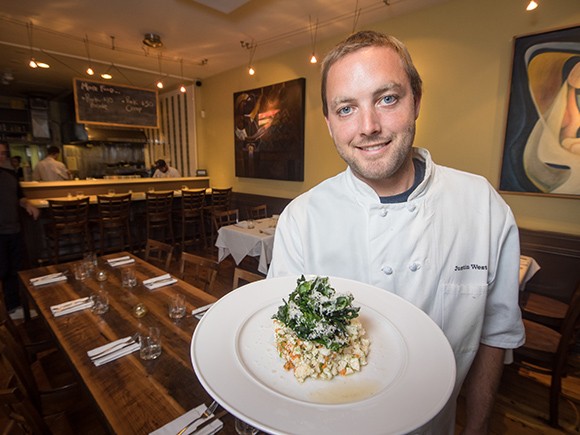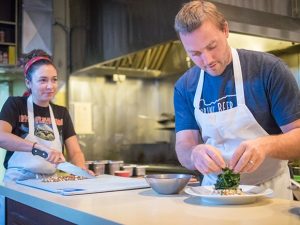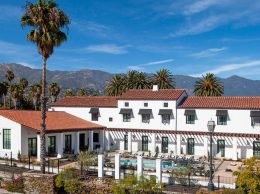The dish on surviving a recession
IN THIS ARTICLE
- Latest news Topic
- Marissa Wenzke Author
By Marissa Wenzke Friday, November 28th, 2014

Justin West, owner of downtown Santa Barbara restaurant Julienne. Despite founding the eatery with his wife Emma during the depths of the recession in 2008, the two have found a recipe for success. (Nik Blaskovich / Business Times photo)
After opening at the peak of the 2008 recession, downtown Santa Barbara restaurant Julienne has since managed to woo the likes of Anthony Bourdain and the Los Angeles Times.
The farm-to-table bistro opened its doors in August 2008, when Justin West and his wife Emma decided to open their own eatery after spending years in the restaurant industry and both attending Le Cordon Bleu College of Culinary Arts in San Francisco.
Since then, the pair has stuck to offering a simple menu of mostly French entrees made with fresh produce from the area farmers markets while using other sustainable cooking practices. And tradition is something they’re used to, as they spend every thanksgiving eating a turkey dinner with their staff at Julienne.
“After we finish serving the public, we sit down to a big staff meal ourselves,” he said. “I tell my staff to bring in their plus-ones, and we open magnums of wine that are given to us by winemakers and other people in the industry throughout the year.”
The restaurant has experienced a busy six years, topping Yelp and Trip Advisor reviews during its first few years in business and snagging a surprise appearance and words of praise from food writer and TV personality Anthony Bourdain in 2009, when he visited Santa Barbara for a UCSB Arts & Lectures event. But according to West, the French eatery faced the usual trials and tribulations of the restaurant business in its earliest days.
After moving to Santa Barbara from San Francisco in 2007, West took a management job at Wine Cask and started thinking about opening a restaurant not long after.
“Within the first year of living here, I was like, ‘This is the place,’ ” he said. “There’s year-round tourism, there’s year-round farmers markets, and the median income is higher than almost anywhere else on the West Coast.”
By May he and Emma were looking for a spot to open a restaurant, and a year later they took the plunge and started building out the current location. West quit his job as a line cook at San Ysidro Ranch to begin development on Julienne, while Emma waited tables at the Hungry Cat.

A meal is prepared in Julienne’s kitchen. Apart from its popularity among locals, the spot has drawn the attention of the likes of celebrity chef Anthony Bourdain. (Nik Blaskovich / Business Times photo)
Three months later, the restaurant opened its doors. But business wasn’t exactly booming, West said.
“It was horribly slow and insanely nerve-racking…with me just kicking myself, like ‘What did we get ourselves into?’ ” he said. “I was next in line for a sous chef position at San Ysidro Ranch. That’s a corporate job: guaranteed salary, benefits, 401k, paid vacation, personal time. And I had just got us into this complete mess of opening our own business.”
But the couple focused on making their business stand out. The farm-to-table concept came to fruition through hand-picking fresh, local produce and using whole animals as much as possible. The menu follows a seasonal tune, sometimes changing to accommodate whatever produce is in season and whatever whole meats happen to be in-store.
While also creating quality dishes, West said these practices follow the model of sustainability that distinguishes Julienne from other downtown restaurants.
“For instance, this week we got a half hog in,” he said. “That 105-pound hog is going to feed 75 people this week, as opposed to ordering that many pork chops to feed those people, where many, many pigs would have to die to feed the same amount of people.”
According to West, these are the kinds of practices that have given Julienne the reputation and clientele following to weather the recession during its first days of business.
“Our attitude was kind of that recessions are good times for people to do business because, especially with the restaurant industry, people are going to be picky and choosy about where they spend their money,” he said. “So if you can establish yourself as the best and establish yourself as having the highest quality in town, then…people are going to come to you. That was kind of our philosophy.”
The son of a chef and restaurant owner in Oregon, West said there are always challenges ahead in the food business, just as much as any industry.
“It’s a very volatile business. Some weeks are great and some aren’t,” he said. But he and Emma don’t have plans for another venture anytime soon. For now, they’re looking to perfect the offerings of Julienne and even tone down the bistro’s high-end feel.
“When people call and ask about the dress code, I just say it’s ‘Santa Barbara casual,’ ” he said. “We just really want to be perceived as a place with good food that’s accessible to real people.”











